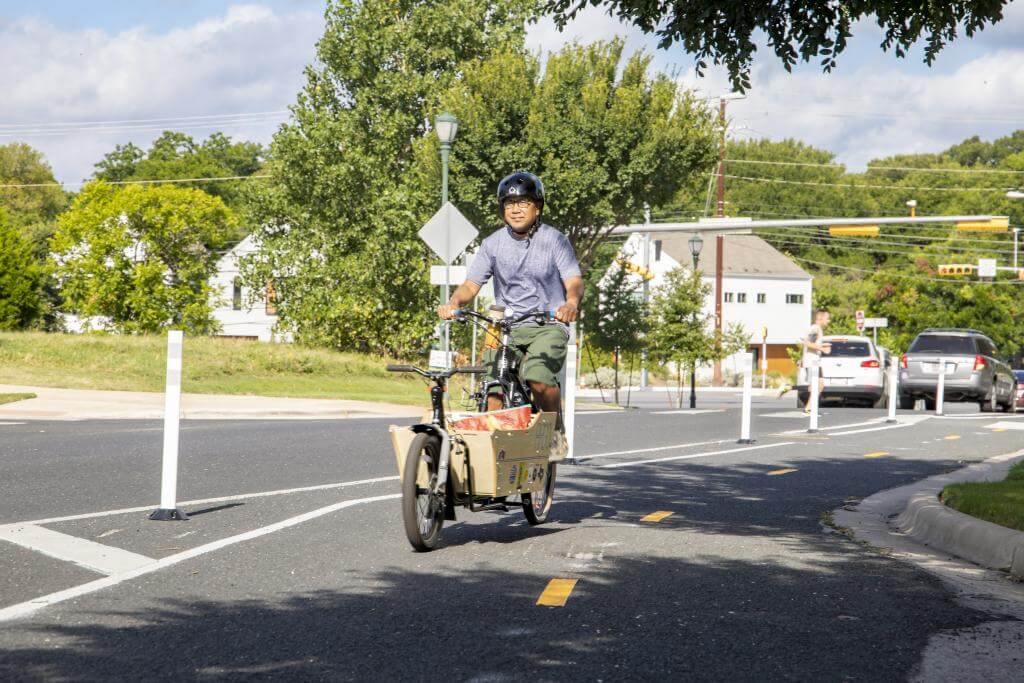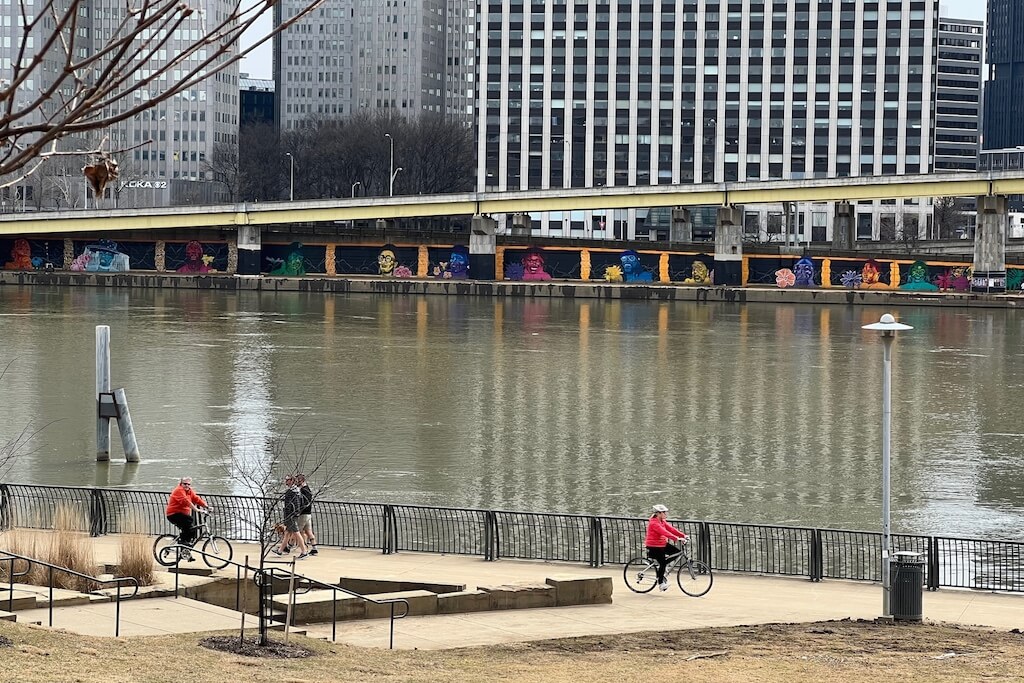Autumn Gear Guide
Find inspiration in our Gear Guide that will keep you out on your bike through wind or rain.
Download NowThe Final Mile was a two-year partnership between PeopleForBikes and Wend Collective to accelerate the installation of complete bike networks in five U.S. cities. The principles behind that successful project are Kyle Wagenschutz, Sara Studdard, and Zoe Kircos — mobility experts that have established the non-profit City Thread to help cities fast-forward cycling network build-outs. […]
The Final Mile was a two-year partnership between PeopleForBikes and Wend Collective to accelerate the installation of complete bike networks in five U.S. cities. The principles behind that successful project are Kyle Wagenschutz, Sara Studdard, and Zoe Kircos — mobility experts that have established the non-profit City Thread to help cities fast-forward cycling network build-outs. Momentum had the chance to chat with them about The Final Mile and the secrets to making cycling networks happen faster and on a larger scale in North America.

The Final Mile is a partnership between PeopleForBikes and Wend Collective with the goal of accelerating the installation of complete mobility networks in five U.S. cities: Austin, Denver, New Orleans, Pittsburgh, and Providence. Not surprisingly, the project team was inspired by what has been happening in Europe.
“During a study tour to Western European cities like Amsterdam and Copenhagen, organizers of the Final Mile program were inspired by the ease with which residents moved seamlessly between walking, biking, and public transit,” Wagenschutz says. “A separate visit to Seville, where an entire cycling network was constructed in only a few short years, challenged the notion that change to city streets takes decades.”
The trip raised the question of why there weren’t any American cities that reflected what was happening in Europe, and why the pace of change seemed glacial in comparison. The Final Thread looked to turn that paradigm upside down and see what could be done in the United States — how large and how quickly could bike networks be created.
“By systematically tapping into existing community support for biking, amplifying that support with paid communications, improving neighborhood-based community engagement, and empowering elected leaders to accelerate the construction of bicycle networks in their community, the Final Mile hoped to create a new paradigm for advocacy in North America,” Wagenschutz adds.
According to Studdard, the Final Mile set out to encourage U.S. cities to rapidly accelerate construction of their planned bicycle networks. In doing so, the hope was that these cities would build hundreds of miles of high quality bike networks, with completion in only two years.
“In order to accomplish this, the cities would need to build a strategy centered on community engagement, and diverse coalition building,” Studdard explains.
And accomplish it they did. In total Austin, Denver, New Orleans, Pittsburgh, and Providence constructed 335 miles of new, safe, and connected bikeways from concept to completion in just 24 months, and are now on pace to fully build their planned networks 25 years earlier than expected.
We are well-aware of the benefits of increased cycling to cities on many levels from climate goals, the livability to personal health and affordability. Cities that invest heavily in developing extensive bike networks and mobility options reap the benefits. But, as Studdard explains, it isn’t always that easy.
“Cities become stuck when the build-out gets bogged down and public support wanes,” she says. “Street improvements take too long to implement and the resulting mobility infrastructure is small in scale, disconnected, and incomplete. Additionally, poor messaging creates fear and distrust, empowering a vocal minority of opposition, and mayors lack the persuasive communication tools needed to change the way streets work.”
The good news is that a wide and diverse swath of people want complete bike networks, and are willing and able to work for that change.
“Survey results gathered from across the country indicate that diverse organizations, community partners, and residents are ready to support mobility networks,” Wagenschutz says.
“Through partnership, The Final Mile helped elected officials, city staff, and community groups develop a shared vision of mobility which they were all committed to achieving. From there, The Final Mile worked to ensure that each partner was clear about their role, and identified where support was needed to allow them to accomplish it — operational funding, communication campaigns, focus groups, public opinion surveys, technical assistance, and program activities.”
The Final Mile provided resources to fill those needs and established measures of accountability and systems of communication that kept the partners at the table during the entire two years.

“Lean into quality infrastructure,” says Studdard, when asked about lessons from the Final Thread that should be passed on to other regions. “Be bold and trust in the strength of your partnerships. Opposition will never go away, so after careful listening and thoughtful accommodation, move quickly and decisively towards completion. The best projects become mediocre projects if left to the court of public opinion.”
Studdard says it’s important to communicate that everyone benefits from bike lanes not just cyclists.
“Whenever your bike project can include sidewalk, crosswalk, transit, or other roadway improvements the better chance of success a city will have,” she adds. “Instead of building bike lanes, make mobility improvements that benefit everyone, regardless of how they choose to move around their city.”
She also suggests that opposition to cars is not helpful. Getting drivers on board to support the implementation of bike infrastructure is a huge win.
“Advance the idea that we can have peace on the road, when everyone has a piece of the road. The best bike advocates don’t ride bikes everyday,” Studdard says. “The best bike advocates are able to describe why bike lanes improve their mobility, even if they will never ride a bike.”
Although a lot has been written about what is happening in cities such as Paris, because, well, Paris. But that doesn’t mean what’s happening in cities such as Austin are insubstantial. In fact, City Thread’s Zoe Kircos says Austin is currently building its bike network with greater funding and pace than Paris, but doesn’t enjoy the same kind of media attention as the French capital.
“The challenge for North American cities is how to move quickly and avoid the pitfalls that generally slow down our political systems,” she adds.
And, there are a lot of things happening over the past months and years that are pushing things in the right direction from gas prices being at an all-time high, to leaders looking for solutions to the climate crisis and traffic congestion, inflation, as well as the sheer growth in e-mobility options.
By and large, people want this.
“Our polling shows that U.S. residents acknowledge and support the idea that more transportation options, including bikes and transit, are the solution to traffic congestion,” Kircos says. “Eighty-one percent would support improved bike infrastructure if it came with other improvements such as better roads and parking. Seventy-five percent feel that bike lanes combined with road, sidewalk, and transit improvements would make their community more livable.”
So what will it take?
“The good news is, it’s already happening. The bad news is, we need it to happen much faster,” Kircos says.
Find inspiration in our Gear Guide that will keep you out on your bike through wind or rain.
Download Now
Leave a comment